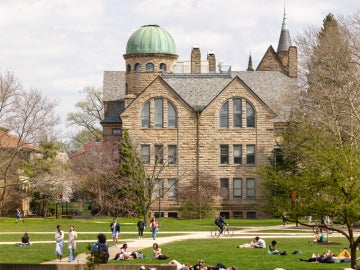Student-Authored CBD Study Named Editors’ Pick
Neuroscience major Caroline Morehouse led research on effects of cannabidiol on cognition.
November 23, 2022
Erich Burnett

Caroline Morehouse, a fourth-year student majoring in neuroscience and Hispanic studies, was the lead author on a study of CBD's impact on cognition. She plans to pursue a career in geriatric medicine.
Photo credit: Office of Communications
Caroline Morehouse, a fourth-year Oberlin student majoring in neuroscience and Hispanic studies, was the lead author on a paper published in the neuroscience journal Behavioral Brain Research in late summer 2022. The article, titled Cannabidiol (CBD) drives sex-dependent impairments in omission, but has no effect on reinforcer devaluation, details research conducted in the lab of Oberlin neuroscience professor Chris Howard.
The lead researcher on a team of Oberlin neuro students, Morehouse had devoted more than a year to studying the effects of CBD on lab mice before submitting an initial draft of the report. (The other students involved in the study—Charlie Maddox ’22, Rochelle van der Merwe ’21, Marwan Ghanem ’22, Robert McLaughlin ’21, and Jesse Scott ’21—graduated prior to Morehouse’s involvement.) With guidance from Howard and input from her peer researchers, she supplied an extensive revision of the first draft and braced for multiple more rounds of the same, as she had been advised to expect.
That never happened. The journal approved the piece after a single round of revisions—and named it the editor’s choice. “I was crying in my bedroom,” says Morehouse, of Mystic, Connecticut, recalling the moment she learned of the honor. “It was just super-exciting!”
“As someone who wants to go to medical school and do all these things that feel so far out in the future, this is one of the first times I’ve gotten immediate gratification for something that I want to put my abilities into. It’s important to have that marker for my time here at Oberlin. To have our hard effort being validated by an outside entity was just so meaningful to each one of us.”
Fully legal and available in everything from deodorant to hamburgers, CBD has earned attention for its potential therapeutic effects in combating anxiety, insomnia, and addictive behaviors, though the link between CBD and addiction—if any—remains unclear. Conducted over a period of two years, the Oberlin study examined the effects of CBD on habit formation and goal-directed behavior. The researchers found that CBD had no discernible effect on habit formation, but it inhibited behavioral flexibility—suggesting that CBD use has a negative impact on cognitive function.
Even more surprising: The observed decline was more pronounced in males than females—a distinction similar to that seen in studies on THC, the cannabis derivative that fuels the high associated with marijuana. Future iterations of CBD research at Oberlin may further probe the link between the impact of CBD and the sex of the user.
“Whenever somebody says Should I take CBD? I say, ‘Do your research,’” Morehouse says. “Maybe invest in another vitamin.”
“I knew, in coming to Oberlin, that if I was doing research, I would actually be doing research...I can’t emphasize enough how well the Oberlin Neuroscience Department prepares us for real-world research contexts.”
Morehouse’s interest in neuroscience research stems from her overarching passion for geriatric medicine; the CBD study focused on processing ability in the striatum, the part of the brain responsible for decision making and habit formation—and a key factor in the onset of neurodegenerative disorders such as Huntington’s and Parkinson’s disease.
“Doing research is a really important part of the process of applying to medical school,” she says. “You learn to think creatively and question systems and experiments. I’d like to take what I’ve learned at Oberlin and apply it to a medical system that is really stagnant and that doesn’t tend to change the ways we care for older adults.
“I knew, in coming to Oberlin, that if I was doing research, I would actually be doing research—not just putting mice in a box. I would be doing experimental design and data analysis.
“The Neuroscience Department here is incredible,” Morehouse adds. “Every one of the professors is amazing in their ability to get undergraduate students to a place where they can pursue their own projects. I can’t emphasize enough how well the Oberlin Neuroscience Department prepares us for real-world research contexts.”
In addition to her neuroscience major, Morehouse is completing an honors project in Spanish—she’s focusing on the effects of the Colombian armed conflict on the elderly—and serves as a student mentor in the Center for Learning, Education and Research in the Sciences.
Since 2020, she has worked alongside the medical staff of Kendal at Oberlin, a retirement community near campus—even living there for several months during the pandemic.
“Some of my best friends are at Kendal,” she beams. “Kendal is wonderful. Visiting them each day while they were in pandemic lockdown informed what I want to do with my career and the ways I can be most helpful with my medical care.”
You may also like…
Oberlin Launches Critical AI Studies Minor in Fall 2026
With a solid foundation in both science and the humanities, this minor ensures students to understand and be able to analyze the ethical, cultural, environmental, political, economic, technological, and labor effects of AI.
Research Roundup
Every day, Oberlin’s faculty and students produce scholarly work that uncovers new insights into how we understand the world, particularly in the areas of sustainability and the environment.
Oberlin Adds Sport Studies and Management Integrative Concentration
Sport is many things: a vehicle for personal inspiration and identity formation, a catalyst for social change, an economic driver, and a contributor to health and well-being. Given all this, sport is...


